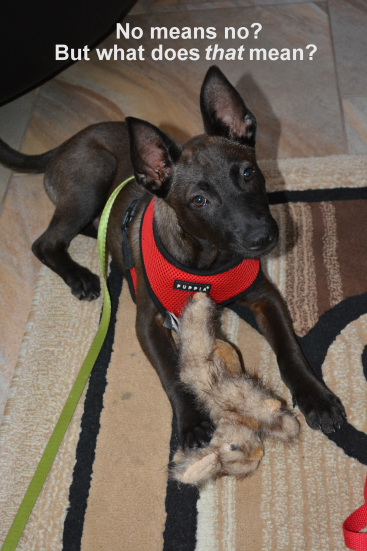
A friend and I were recently walking out my front door while my dog, Kona, was close at our heels. She turned around and told him “no”. I told her that word means nothing to him and asked him to “back up” instead (a behavior he knows well). This sparked the conversation of “you’re a dog trainer, how does your dog not understand the word ‘no’?” My simple answer is “because he’s never been taught what that means”.
Dogs are not born with an inherent knowledge of the human language or culture. Can they learn a word by the context in which it is delivered? You bet! But it’s up to us to attach some useful information to that word to help them navigate our world where we expect them to live within our expectations. If I yelled “no!” at Kona in a stern tone would he immediately stop what he was doing? He might stop in that instant but what is he supposed to do after that? It’s not really fair for me to tell him to stop doing something without providing any follow up information.
How many of us have had this conversation with our significant other:
You: What do you want for dinner?
SO: I don’t know. What do you want?
You: How about Chinese food?
SO: No.
You: Ok, how about Mexican?
SO: No.
You: Then why don’t YOU pick something!
It’s frustrating when someone tells you “no” without providing an alternative isn’t it? Without any additional information you don’t know what to do next. Is he/she saying “no” to Chinese food because they aren’t hungry or because they don’t like Chinese? Did they just eat Mexican for lunch and don’t want it again for dinner? WHAT DOES IT MEAN?? Without any additional information you have no idea what to do next! It’s the same for our dogs. “No” doesn’t hold any weight unless you’ve associated a meaning to it for a specific behavior.
It is very common for us humans to think “no” can be just a blanket term for “stop what you’re doing this instant” (and don’t do it again) but in reality, most dogs have no idea what that means and are just responding to the tone of our voices. I have taught my dogs many useful behaviors that are all on cue, meaning they have a word or signal attached to them. I have taught them to problem solve and to respond to my cues. I taught them all of this through positive reinforcement training based on mutual trust and respect.
I have never had the need to teach my dogs “no” because it has no use in our relationship. Do my dogs do things on occasion that I might not like? Of course! But that’s where the other behaviors they know come into play. I will discuss some alternate behaviors you can teach to prevent unwanted behaviors in a follow up post. In the meantime, if anyone has a solution to the ongoing “what do you want for dinner?” debate with your SO, please share in the comments!


February 5, 2016 at 9:59 pm
Amen!!!!!!
February 5, 2016 at 11:00 pm
Reblogged this on Clicker Chronicles and commented:
This goes for horses, too.
February 6, 2016 at 11:12 pm
Why not say “No! Sit!” Stop the undesirable behavior and give the dog information about WHAT to do.
November 8, 2016 at 5:14 pm
If the cue you give the dog e.g. “sit” already interrupts the undesirable behavior and gives the dog something else to do, then there is no reason to add in the “no” because it adds no useful information.
February 8, 2016 at 10:18 pm
What is the breed in that picture? Lovely. I would like to know.
November 8, 2016 at 5:15 pm
Evilene, thank you! We think Kona is beautiful too. We are guessing that he is a Xoloitzcuintli / Belgian Malinois mix but we aren’t sure. I just ordered a DNA test for him so when we get those results back I will let you know!
September 19, 2016 at 5:16 pm
Thank you for posting this! My own dogs have never learned the word “no” simply because that tells them absolutely nothing about what I prefer for them to do. They have a great vocabulary arsenal, e.g. “leave it,” “wait,” “go bed,” “kennel up,” etc. I also advocate against the word “no” for young human children because the problem remains; i.e. these children have no idea what alternative behaviours can be performed.
November 8, 2016 at 5:11 pm
Thanks for your comment En Elle. I absolutely agree that it is just as important to teach human children alternate behaviors as well.
October 28, 2016 at 3:59 pm
Where are they alternate behaviors you said you would have in a follow up post? (You say “I will discuss some alternate behaviors you can teach to prevent unwanted behaviors in a follow up post.”)
November 8, 2016 at 5:10 pm
Thanks for reading and for the reminder Deb! I’ve been working on a follow up post but haven’t had to time to finish it yet. But you’re right, it is very important to talk about alternate behaviors so I will try to have that it up in the near future.